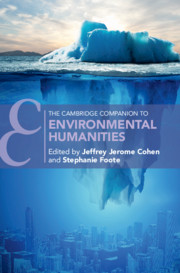Book contents
- The Cambridge Companion to Environmental Humanities
- The Cambridge Companion to Environmental Humanities
- Copyright page
- Contents
- Notes on Contributors
- Acknowledgments
- Chronology
- Chapter 1 Introduction: Climate Change/Changing Climates
- Chapter 2 The Commons
- Chapter 3 Rights
- Chapter 4 Time as Kinship
- Chapter 5 The Nature of Gender
- Chapter 6 Race, Health, and Environment
- Chapter 7 Narrative and Environmental Innovation
- Chapter 8 Climate Fictions: Future-Making Technologies
- Chapter 9 Apocalypse/Extinction
- Chapter 10 Multispecies
- Chapter 11 Food
- Chapter 12 Plants
- Chapter 13 Extraction
- Chapter 14 Ice/Water/Vapor
- Chapter 15 Rocks
- Chapter 16 Coal/Oil
- Chapter 17 Waste
- Chapter 18 Ecomedia
- Chapter 19 New Materialism and the Nonhuman Story
- Chapter 20 Risk
- Chapter 21 Coda: Virus
- Bibliography
- Index
- Cambridge Companions To Literature
- References
Chapter 20 - Risk
Published online by Cambridge University Press: 12 August 2021
- The Cambridge Companion to Environmental Humanities
- The Cambridge Companion to Environmental Humanities
- Copyright page
- Contents
- Notes on Contributors
- Acknowledgments
- Chronology
- Chapter 1 Introduction: Climate Change/Changing Climates
- Chapter 2 The Commons
- Chapter 3 Rights
- Chapter 4 Time as Kinship
- Chapter 5 The Nature of Gender
- Chapter 6 Race, Health, and Environment
- Chapter 7 Narrative and Environmental Innovation
- Chapter 8 Climate Fictions: Future-Making Technologies
- Chapter 9 Apocalypse/Extinction
- Chapter 10 Multispecies
- Chapter 11 Food
- Chapter 12 Plants
- Chapter 13 Extraction
- Chapter 14 Ice/Water/Vapor
- Chapter 15 Rocks
- Chapter 16 Coal/Oil
- Chapter 17 Waste
- Chapter 18 Ecomedia
- Chapter 19 New Materialism and the Nonhuman Story
- Chapter 20 Risk
- Chapter 21 Coda: Virus
- Bibliography
- Index
- Cambridge Companions To Literature
- References
Summary
The chapter begins with a brief genealogy of new materialism and inquiry into the significance of the nonhuman stories entangled in the ethical, political, scientific, and theoretical complexities of the Anthropocene. It first explains the convergence of the new materialism(s) and environmental humanities on ecologically engaged collaborative thinking in responding to bioethical, socio-cultural, and scientific questions that arise from the challenges of Anthropocene. It then discusses how new materialism has espoused the postmodern and poststructuralist disclosure of the link between the dualistic conceptions of the world and the traditional realist systems of representation. The broad argument is that the significance of the agentic capacity of matter in producing layers of expressivity has undermined the established credo about storytelling being uniquely all too human. The “nonhuman story” is argued to mark an important shift in the foundational notions of narrative and storytelling. Material ecocriticism re-envisions narrative as the signifying agency of living matter or narrative agency. Material ecocriticism sees the world as a site of narrativity where narrative agencies – the building blocks of storied matter – demonstrate some degree of creative experience.
- Type
- Chapter
- Information
- The Cambridge Companion to Environmental Humanities , pp. 273 - 285Publisher: Cambridge University PressPrint publication year: 2021

